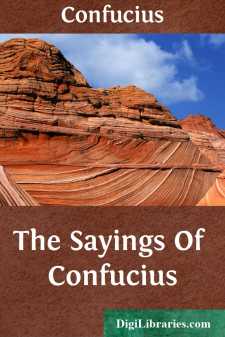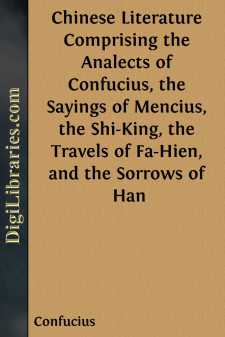Categories
- Antiques & Collectibles 13
- Architecture 36
- Art 48
- Bibles 22
- Biography & Autobiography 813
- Body, Mind & Spirit 142
- Business & Economics 28
- Children's Books 15
- Children's Fiction 12
- Computers 4
- Cooking 94
- Crafts & Hobbies 4
- Drama 346
- Education 46
- Family & Relationships 57
- Fiction 11828
- Games 19
- Gardening 17
- Health & Fitness 34
- History 1377
- House & Home 1
- Humor 147
- Juvenile Fiction 1873
- Juvenile Nonfiction 202
- Language Arts & Disciplines 88
- Law 16
- Literary Collections 686
- Literary Criticism 179
- Mathematics 13
- Medical 41
- Music 40
- Nature 179
- Non-Classifiable 1768
- Performing Arts 7
- Periodicals 1453
- Philosophy 64
- Photography 2
- Poetry 896
- Political Science 203
- Psychology 42
- Reference 154
- Religion 513
- Science 126
- Self-Help 84
- Social Science 81
- Sports & Recreation 34
- Study Aids 3
- Technology & Engineering 59
- Transportation 23
- Travel 463
- True Crime 29
Confucius
Confucius (551–479 BCE) was a Chinese philosopher, teacher, and political figure whose ideas profoundly shaped Chinese culture and ethics. He is best known for his teachings on morality, proper social relationships, and governance, which are compiled in "The Analects." Confucius emphasized virtues such as filial piety, righteousness, and benevolence, advocating for a harmonious society where individuals act according to their roles and duties. His ideas laid the foundation for Confucianism, a philosophy that influenced East Asian societies for centuries.
Author's Books:
Sort by:
by:
Confucius
INTRODUCTION Confucius was born in the year 550 b.c., in the land of Lu, in a small village, situated in the western part of the modern province of Shantung. His name was K'ung Ch'iu, and his style (corresponding to our Christian name) was Chung-ni. His countrymen speak of him as K'ung Fu-tzu, the Master, or philosopher K'ung. This expression was altered into Confucius by the Jesuit...
more...
by:
Confucius
THE ANALECTS BOOK I On LearningвÐâMiscellaneous Sayings:вÐâ "To learn," said the Master, "and then to practise opportunely what one has learntвÐâdoes not this bring with it a sense of satisfaction? "To have associates in study coming to one from distant partsвÐâdoes not this also mean pleasure in store? "And are not those who, while not...
more...



